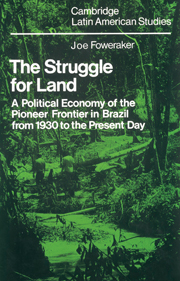 The Struggle for Land
The Struggle for Land Published online by Cambridge University Press: 29 October 2009
Traditionally in Brazil land is titled long before it is occupied. Unexplored regions in the interior are likely to have complex legal histories and many areas within these regions will be titled more than once. For a long time settlement of the continent was confined to the coast and the colonisers seemed to baulk at the prospect of conquering the vast and unknown interior. During the colonial administration the territory was conceded in law even before its extent could be judged with any measure of accuracy. This initial legal division of the land (into sesmarias) spawned a series of minor concessions. Since that time, for different economic and political motives in different periods, titles have proliferated and as occupation proper has continued to meet with delays and difficulties up till today, few constraints have acted to stem the issue of titles. This titling has created the conditions for conflict over the right to land in nearly all frontier regions.
It is interesting to observe that of the folk figures of the Brazilians the bandeirante looms largest in their history because these explorers broke the cultural and geographical boundaries and carried their forays deep into the heartland. But the bandeirantes did not occupy the land but merely claimed it for the crown; or for the nation. The actual occupation of the land had to wait for the unsung hero of Brazilian history, the posseiro, who was to claim the land by cultivating it.
To save this book to your Kindle, first ensure [email protected] is added to your Approved Personal Document E-mail List under your Personal Document Settings on the Manage Your Content and Devices page of your Amazon account. Then enter the ‘name’ part of your Kindle email address below. Find out more about saving to your Kindle.
Note you can select to save to either the @free.kindle.com or @kindle.com variations. ‘@free.kindle.com’ emails are free but can only be saved to your device when it is connected to wi-fi. ‘@kindle.com’ emails can be delivered even when you are not connected to wi-fi, but note that service fees apply.
Find out more about the Kindle Personal Document Service.
To save content items to your account, please confirm that you agree to abide by our usage policies. If this is the first time you use this feature, you will be asked to authorise Cambridge Core to connect with your account. Find out more about saving content to Dropbox.
To save content items to your account, please confirm that you agree to abide by our usage policies. If this is the first time you use this feature, you will be asked to authorise Cambridge Core to connect with your account. Find out more about saving content to Google Drive.